人教版(2019)选择性必修第一册Unit 4 Body Language词汇默写 词性转换 必备短语 重点词汇讲解 单元语法 重点句式学案(含答案)
文档属性
| 名称 | 人教版(2019)选择性必修第一册Unit 4 Body Language词汇默写 词性转换 必备短语 重点词汇讲解 单元语法 重点句式学案(含答案) |
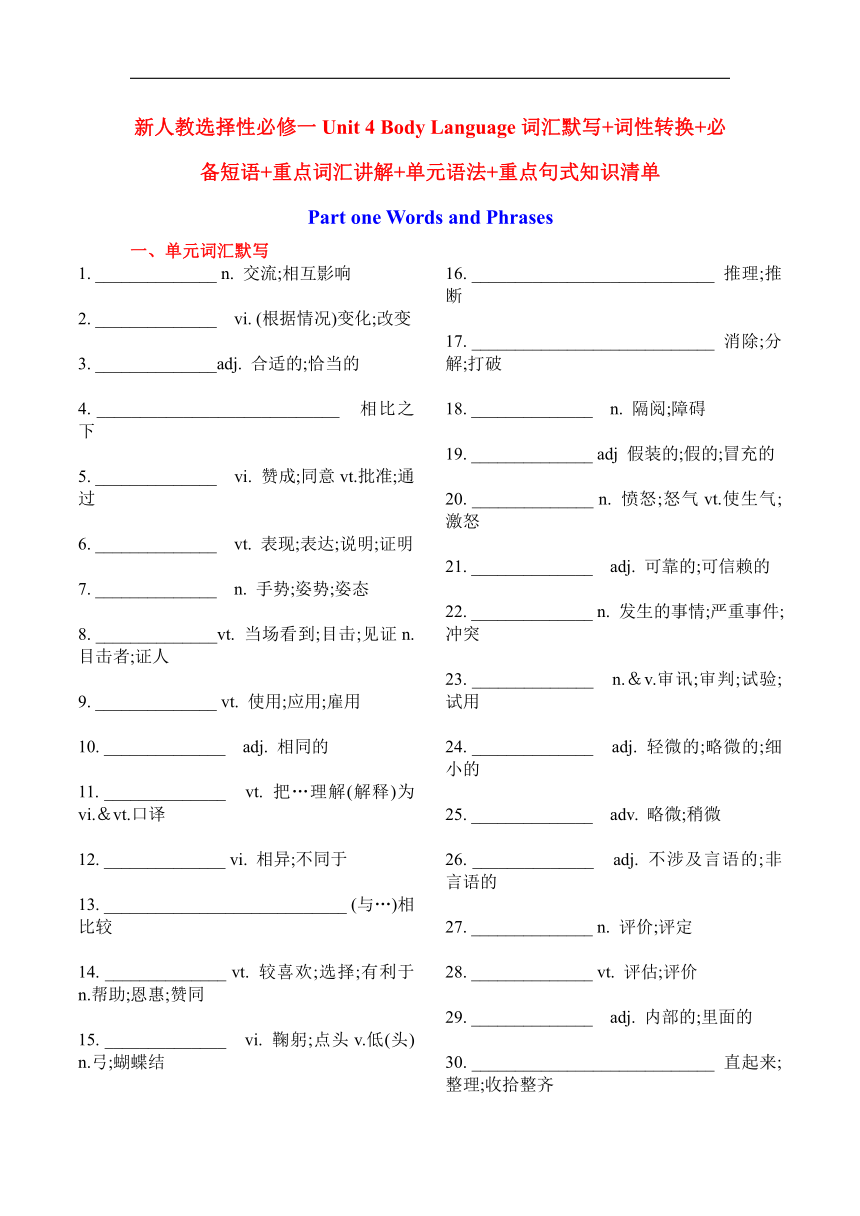
|
|
| 格式 | docx | ||
| 文件大小 | 38.3KB | ||
| 资源类型 | 教案 | ||
| 版本资源 | 人教版(2019) | ||
| 科目 | 英语 | ||
| 更新时间 | 2024-03-12 00:00:00 | ||
图片预览

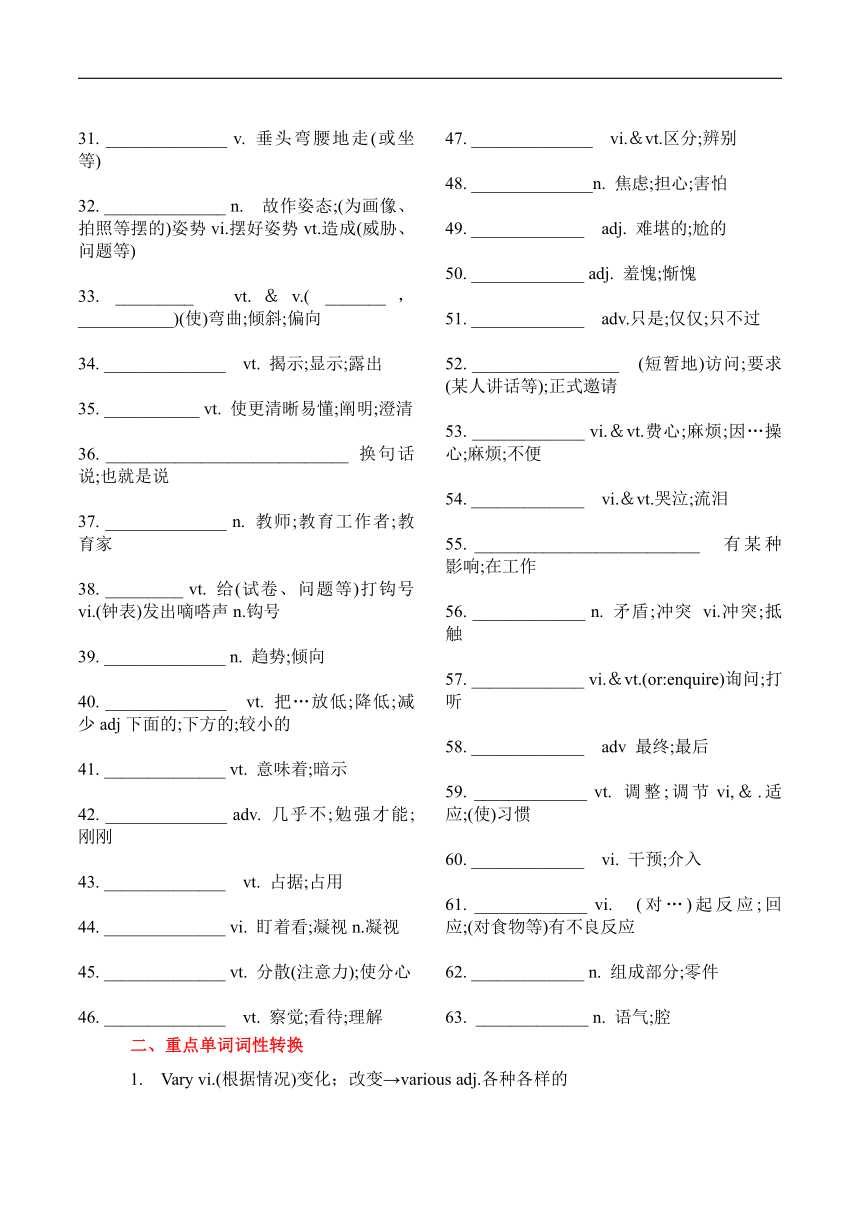
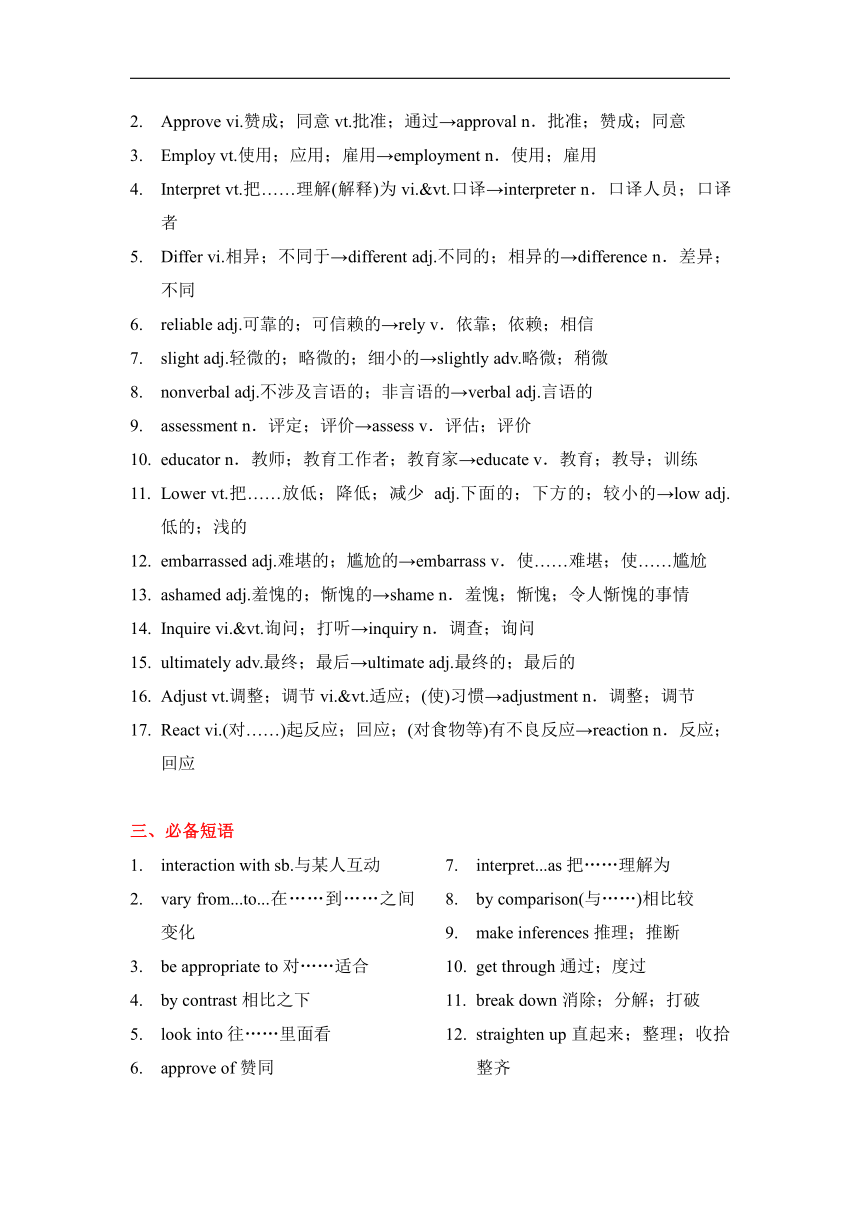
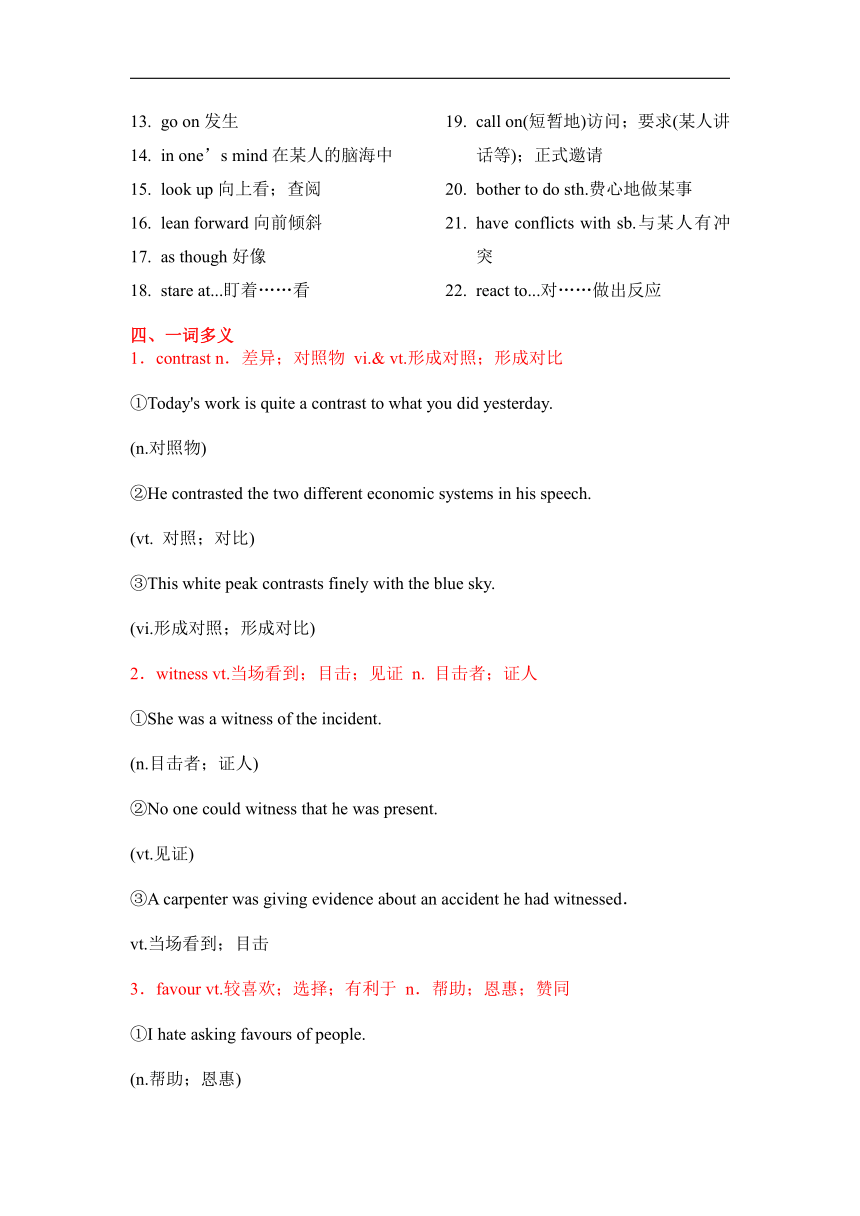
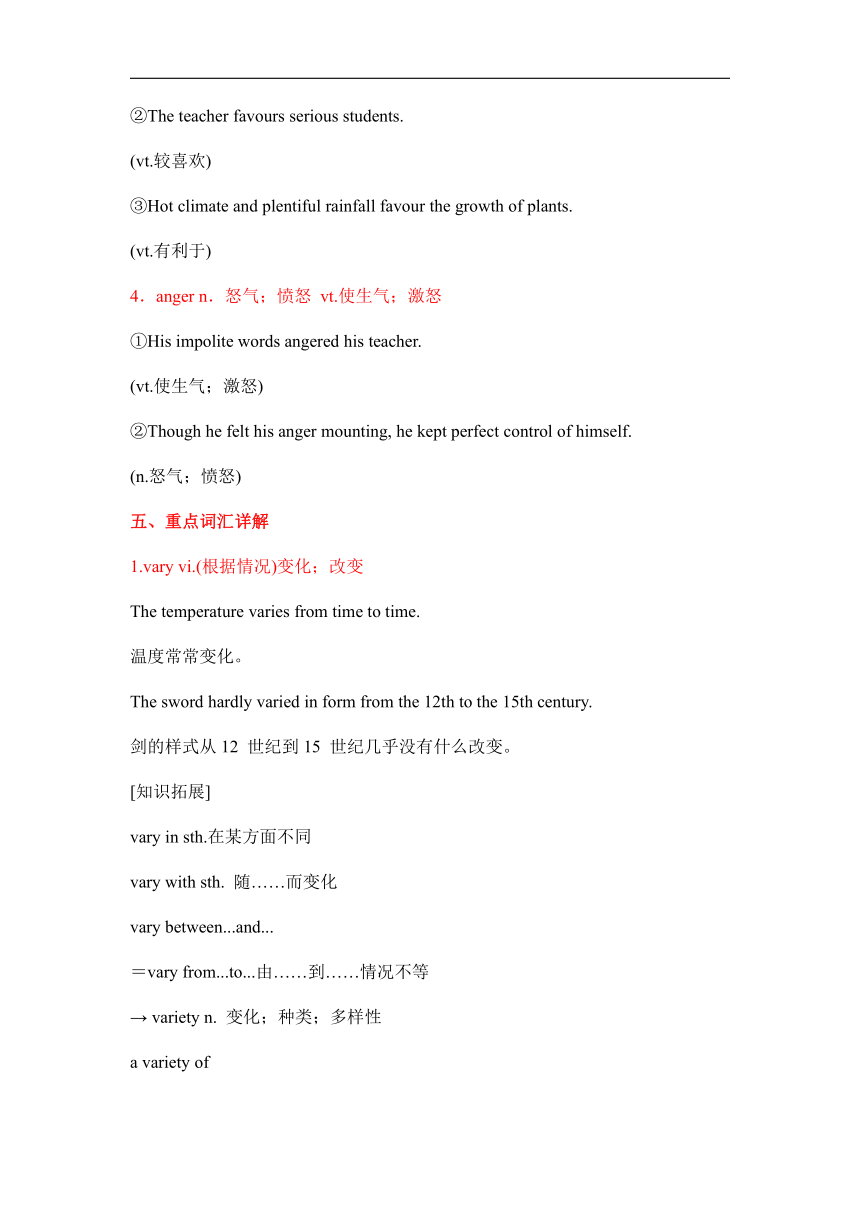
文档简介
新人教选择性必修一Unit 4 Body Language词汇默写+词性转换+必备短语+重点词汇讲解+单元语法+重点句式知识清单
Part one Words and Phrases
一、单元词汇默写
1. ______________ n. 交流;相互影响
2. ______________ vi. (根据情况)变化;改变
3. ______________adj. 合适的;恰当的
4. ____________________________ 相比之下
5. ______________ vi. 赞成;同意vt.批准;通过
6. ______________ vt. 表现;表达;说明;证明
7. ______________ n. 手势;姿势;姿态
8. ______________vt. 当场看到;目击;见证n.目击者;证人
9. ______________ vt. 使用;应用;雇用
10. ______________ adj. 相同的
11. ______________ vt. 把…理解(解释)为vi.&vt.口译
12. ______________ vi. 相异;不同于
13. ____________________________ (与…)相比较
14. ______________ vt. 较喜欢;选择;有利于n.帮助;恩惠;赞同
15. ______________ vi. 鞠躬;点头v.低(头) n.弓;蝴蝶结
16. ____________________________ 推理;推断
17. ____________________________ 消除;分解;打破
18. ______________ n. 隔阅;障碍
19. ______________ adj 假装的;假的;冒充的
20. ______________ n. 愤怒;怒气vt.使生气;激怒
21. ______________ adj. 可靠的;可信赖的
22. ______________ n. 发生的事情;严重事件;冲突
23. ______________ n.&v.审讯;审判;试验;试用
24. ______________ adj. 轻微的;略微的;细小的
25. ______________ adv. 略微;稍微
26. ______________ adj. 不涉及言语的;非言语的
27. ______________ n. 评价;评定
28. ______________ vt. 评估;评价
29. ______________ adj. 内部的;里面的
30. ____________________________ 直起来;整理;收拾整齐
31. ______________ v. 垂头弯腰地走(或坐等)
32. ______________ n. 故作姿态;(为画像、拍照等摆的)姿势vi.摆好姿势vt.造成(威胁、问题等)
33. _________ vt.&v.( _______,___________)(使)弯曲;倾斜;偏向
34. ______________ vt. 揭示;显示;露出
35. ___________ vt. 使更清晰易懂;阐明;澄清
36. ____________________________ 换句话说;也就是说
37. ______________ n. 教师;教育工作者;教育家
38. _________ vt. 给(试卷、问题等)打钩号vi.(钟表)发出嘀嗒声n.钩号
39. ______________ n. 趋势;倾向
40. ______________ vt. 把…放低;降低;减少adj下面的;下方的;较小的
41. ______________ vt. 意味着;暗示
42. ______________ adv. 几乎不;勉强才能;刚刚
43. ______________ vt. 占据;占用
44. ______________ vi. 盯着看;凝视n.凝视
45. ______________ vt. 分散(注意力);使分心
46. ______________ vt. 察觉;看待;理解
47. ______________ vi.&vt.区分;辨别
48. ______________n. 焦虑;担心;害怕
49. _____________ adj. 难堪的;尬的
50. _____________ adj. 羞愧;惭愧
51. _____________ adv.只是;仅仅;只不过
52. _________________ (短暂地)访问;要求(某人讲话等);正式邀请
53. _____________ vi.&vt.费心;麻烦;因…操心;麻烦;不便
54. _____________ vi.&vt.哭泣;流泪
55. __________________________ 有某种影响;在工作
56. _____________ n. 矛盾;冲突 vi.冲突;抵触
57. _____________ vi.&vt.(or:enquire)询问;打听
58. _____________ adv 最终;最后
59. _____________ vt. 调整;调节vi,&.适应;(使)习惯
60. _____________ vi. 干预;介入
61. _____________ vi. (对…)起反应;回应;(对食物等)有不良反应
62. _____________ n. 组成部分;零件
_____________ n. 语气;腔
二、重点单词词性转换
Vary vi.(根据情况)变化;改变→various adj.各种各样的
Approve vi.赞成;同意vt.批准;通过→approval n.批准;赞成;同意
Employ vt.使用;应用;雇用→employment n.使用;雇用
Interpret vt.把……理解(解释)为vi.&vt.口译→interpreter n.口译人员;口译者
Differ vi.相异;不同于→different adj.不同的;相异的→difference n.差异;不同
reliable adj.可靠的;可信赖的→rely v.依靠;依赖;相信
slight adj.轻微的;略微的;细小的→slightly adv.略微;稍微
nonverbal adj.不涉及言语的;非言语的→verbal adj.言语的
assessment n.评定;评价→assess v.评估;评价
educator n.教师;教育工作者;教育家→educate v.教育;教导;训练
Lower vt.把……放低;降低;减少 adj.下面的;下方的;较小的→low adj.低的;浅的
embarrassed adj.难堪的;尴尬的→embarrass v.使……难堪;使……尴尬
ashamed adj.羞愧的;惭愧的→shame n.羞愧;惭愧;令人惭愧的事情
Inquire vi.&vt.询问;打听→inquiry n.调查;询问
ultimately adv.最终;最后→ultimate adj.最终的;最后的
Adjust vt.调整;调节vi.&vt.适应;(使)习惯→adjustment n.调整;调节
React vi.(对……)起反应;回应;(对食物等)有不良反应→reaction n.反应;回应
三、必备短语
interaction with sb.与某人互动
vary from...to...在……到……之间变化
be appropriate to对……适合
by contrast相比之下
look into往……里面看
approve of赞同
interpret...as把……理解为
by comparison(与……)相比较
make inferences推理;推断
get through通过;度过
break down消除;分解;打破
straighten up直起来;整理;收拾整齐
go on发生
in one’s mind在某人的脑海中
look up向上看;查阅
lean forward向前倾斜
as though好像
stare at...盯着……看
call on(短暂地)访问;要求(某人讲话等);正式邀请
bother to do sth.费心地做某事
have conflicts with sb.与某人有冲突
react to...对……做出反应
一词多义
1.contrast n.差异;对照物 vi.& vt.形成对照;形成对比
①Today's work is quite a contrast to what you did yesterday.
(n.对照物)
②He contrasted the two different economic systems in his speech.
(vt. 对照;对比)
③This white peak contrasts finely with the blue sky.
(vi.形成对照;形成对比)
2.witness vt.当场看到;目击;见证 n. 目击者;证人
①She was a witness of the incident.
(n.目击者;证人)
②No one could witness that he was present.
(vt.见证)
③A carpenter was giving evidence about an accident he had witnessed.
vt.当场看到;目击
3.favour vt.较喜欢;选择;有利于 n.帮助;恩惠;赞同
①I hate asking favours of people.
(n.帮助;恩惠)
②The teacher favours serious students.
(vt.较喜欢)
③Hot climate and plentiful rainfall favour the growth of plants.
(vt.有利于)
4.anger n.怒气;愤怒 vt.使生气;激怒
①His impolite words angered his teacher.
(vt.使生气;激怒)
②Though he felt his anger mounting, he kept perfect control of himself.
(n.怒气;愤怒)
重点词汇详解
1.vary vi.(根据情况)变化;改变
The temperature varies from time to time.
温度常常变化。
The sword hardly varied in form from the 12th to the 15th century.
剑的样式从12 世纪到15 世纪几乎没有什么改变。
[知识拓展]
vary in sth.在某方面不同
vary with sth. 随……而变化
vary between...and...
=vary from...to...由……到……情况不等
→ variety n. 变化;种类;多样性
a variety of
=varieties of许多的;各种各样的
→ various adj. 各种各样的
由于各种原因,我不愿见他。
For various reasons, I'd prefer not to meet him.
=For a variety of reasons, I'd prefer not to meet him.
=For varieties of reasons, I'd prefer not to meet him.
2.approve vi.赞成;同意 vt.批准;通过
In other countries, by contrast, eye contact is not always approved of.
相反,在另一些国家,眼神交流并不总是被认可。
The minister approved the building plan.
部长批准了该建筑计划。
Her father will never approve of her marriage to you.
他父亲永远不会同意她和你结婚。
[知识拓展]
approve of 赞成;同意
approve of sb./sb.'s (doing)sth. 同意某人(做)某事
→ approval n. 赞成;同意;批准;认可
I don't need approval all the time.If someone does not approve of me, I will still be okay.
我不总是需要别人的认同,如果有人不认同我,我还是会觉得没事。
3.witness vt.当场看到;目击;见证 n.目击者;证人
A witness was examined by him in a court of law.
他在法庭上质问一个证人。
He gave witness on behalf of an accused person.
他为被告作证。
[知识拓展]
(1)witness sth. 目击了某事
witness to (doing)sth.证实,证明(做)某事
witness for 为……作证
(2)be a witness to sth.是某事的证据/证人
bear/give witness to 做……的证人;为……作证
司机作证说,他看到此人进入那栋大楼。
The driver witnessed to having seen the man enter the building.
这些事实证明了他的粗心。
These facts are a witness to his carelessness.
The witness who witnessed the incident gave witness to the police and promised to be a witness.
这个目击了这起事故的目击者向警察提交了证据并且答应做证人。
4.differ vi.不同于;相异
Japanese differs greatly from French in pronunciation.
日语发音和法语大不相同。
Conditions of employment differ according to the type of company you are working for.
雇佣条件因供职公司的不同而有差异。
[知识拓展]
differ from...与……不同/有区别
differ in...在……方面不同
differ with sb.on/about/over sth.与某人在某事上持不同(看法)
→ different adj.不同的
be different from... 与……不同
→ difference n.不同,差别
make a difference (to...)(对……)有作用或影响
Learners with different cultural backgrounds differ a lot in their thinking patterns and learning styles.The difference can be investigated and explained.
不同文化背景的学习者在思维模式和学习风格上有很大的不同。这种差异可以被研究和解释。
5.favour vt.较喜欢;选择;有利于 n.帮助;恩惠;赞同
A mother shouldn't show too much favour to one of her children.
母亲不应该对一个孩子表现出过多的宠爱。
I must decline to show favour to any of the candidates.
我必须拒绝偏袒任何一位候选人。
[知识拓展]
do sb.a favour
=do a favour for sb.帮某人的忙
ask sb.for a favour
=ask a favour of sb.请求某人帮忙
in favour of... 支持……
in one's favour 对某人有利
今天你能帮我个忙去学校接山姆吗?
Could you do me a favour and pick up Sam from school today =Could you do a favour for me and pick up Sam from school today
我想请你帮忙,你能把你的电话借给我吗?
I want to ask a favour of you; will you lend me your cell phone
=I want to ask you for a favour;will you lend me your cell phone
6.break down消除;分解;打破
Our car broke down and we had to draw it to a garage.
我们的车坏了, 不得不把它拖到修车厂去。
By then the gate was being broken down.
那时候大门快要被砸开了。
[知识拓展]
break away from脱离;摆脱;挣脱;打破陈规
break in 闯入;强行进入
break out 突然发生;爆发(不用于被动语态)
break up 打碎;分裂;解体;解散
7.reliable adj.可信赖的;可靠的
It has a highly reliable control system.
它具备一套极可靠的控制系统。
He's a good musician and totally reliable.
他是个出色的音乐家,而且非常可靠。
[知识拓展]
a reliable friend 可靠的朋友
be reliable as 作为……是可靠的
→ rely v. 信任;信赖;依赖;依靠
rely on/upon 依靠;依赖
rely on it that... 相信
The land, the essential means of production, is the most reliable living security that the peasants can rely on.
土地作为基本的生产资料,是农民可以依赖的最可靠的生活保障。
8.bend vt.&vi.(bent, bent)(使)弯曲;倾斜;偏向
bend the truth 扭曲事理;歪曲事实
bend one’s mind/efforts to sth. 致力于某事;专心致志
9.tendency n. 趋势;倾向
a tendency (for sb./sth.) to do ...
a tendency to/towards ... ... ...的倾向/
→ tend vt.往往会 vi.趋向 vi.&vt.照管;护理
Part two Grammar
重点1动名词作宾语
① Elsewhere , people favour shaking hands , bowing from the waist , or nodding the head when they meet someone else .在其他地方,人们见面时喜欢握手、弯腰鞠躬或点头。( shaking , bowing , nodding 是动名词作 favour 的宾语)[P38]② In France , a person encountering an identical gesture may interpret it as meaning zero .国,看到同一个手势的人可能会将其解读为"零"。( meaning 是动名词作 as 的宾语)
①后常接动名词作宾语的动词或动词短语
(1)常接动名词作宾语的动词有: admit , advise , allow , appreciate , avoid , consider , deny , delay , enjoy , escape , fancy , finish , forbid , imagine , keep , mention , mind , miss , permit , practise , risk , resist , suggest , quit 等。· The youngsters admitted planning trips around potential photo - opportunities and then messaging friends - and friends of friends - to demand " likes " for their online posts .这些年轻人承认,他们计划在有潜在拍照机会的地方旅行,然后 给朋友们以及朋友的朋友﹣发信息,要求给他们的网上帖子点"赞"。
● To avoid missing the last train , please check the last train time posted in stations .为了避免错过末班火车,请核查车站张贴的末班火车时间。
● I suggested putting off the sports meeting .我建议将运动会延期。
常接动名词作宾语的动词短语有: can ' t help (情不自禁), feel like (想要), give up (放弃), insist on (坚持), put off (推迟), set about (开始), be busy ( in )(忙于), be / get used to (习惯于), object to (反对), pay attention to (注意), stick to (坚持), get down to (着手做), look forward to (期盼), succeed in (成功), waste / spend time / money (浪费/花费时间/金钱在), be worth (值得)等。
● Nowadays , rather than going out to meet people in person , more and more young people feel like socialising with others via electronic devices .如今,越来越多的年轻人喜欢通过电子设备与他人交往,而不是亲自出去见面。
● He insisted on walking to work though he was tired .尽管很累,但他坚持步行去上班。
● As is announced in today ' s paper , they have succeeded in solving many problems according to the new theory .正如今天的报纸所宣布的,他们已经成功地根据新理论解决了许多问题。
联想拓展·
后接动名词作宾语的动词(短语)口诀
喜欢考虑不可免( enjoy , consider , escape / avoid )
停止放弃太冒险( stop , give up , risk )
反对想象莫推延( object to , imagine , delay / put off )
要求完成是期望( require , finish , look forward to )
建议继续勤苦练( suggest , go on , practise )
不禁原谅要坚持( can ' t help , excuse , insist on )
继续注意始成功( keep on , mind , succeed in )
特别注意.
① advise , allow , permit , forbid 后有名词或代词时,接动词不定式作宾补。
advise sb to do sth 建议某人做某事
allow sb to do sth 允许某人做某事
permit sb to do sth 允许某人做某事
forbid sb to do sth 禁止某人做某事
② stop / go on 后接动名词作宾语,表示"停止/继续做某事"; stop / go on 后接不定式,表示"停下来/继续去做另一件事",不定式作目的状语。
②有些动词,如 like , love , prefer , hate , begin , start 等,后面可接动词不定式和动名词作宾语,意义上基本没有差别。
● After the teacher left the classroom , the students began to do / doing their homework .老师离开教室后,学生们开始做作业。
③ need / require / want 作"需要"讲时, deserve 作"应受;应得"讲时,其后接动名词的主动形式,相当于接动词不定式的被动形式,表示"需要被做"和"值得被做"。·
● The baby requires looking after / to be looked after carefully .这个婴儿需要被认真看护。
● His heroic deeds deserved praising / to be praised .他的英勇行为值得被称赞。
④有些动词或动词短语既可接动词不定式作宾语,也可接动名词作宾语,其区别如下:
谓语动词词义不变的情况下,当表示发生过的动作或比较抽象的意义时,多用动名词作宾语;而表示某个将来的动作或具体的意义时,则多用不定式作宾语。
forget to do / doing sth 忘记去做/忘记做过某事
remember to do / doing sth 记得去做/记得做过某事
谓语动词词义不同的情况下,具体用法如下:
mean to do / doing sth 打算做/意味着做某事
regret to do / doing sth 很遗憾(抱歉)要做/后悔做过某事
try to do / doing sth 尽力做/试着做某事
can ' t help ( to ) do / doing sth 不能帮忙做/情不自禁地做某事
● We must remember to close that window .我们一定要记得关上那扇窗。
● I still remember being taken to the Famen Temple and what I saw there .我仍记得别人带我去过法门寺,并记得在那里我所看到的东西。
● He couldn ' t get across his idea in the speech , so we didn ' t know what he had meant to say .他在演讲中无法说清自己的想法,所以我们不知道他想说什么。
● Missing the bus means waiting for another ten minutes .错过这趟公交车意味着再等十分钟。
重点2动词﹣ ing 形式(动名词、现在分词)表语
The crucial thing is using body language in a way that is appropriate to the culture you are in .重要的是要以一种适合你所处文化的方式来使用肢体语言。( using body language 是动名词短语作表语)[P38]
Ultimately , my duty is helping every student to learn .最终,我的职责是帮助每个学生学习。( helping every student to learn 是动名词短语作表语)[P44]
①动名词作表语,多表示抽象的、经常性的动作,用于说明主语的内容。此时主语和表语为同一概念,两者可以互换位置。
● One of his weaknesses is telling lies .= Telling lies is one of his weaknesses .他的缺点之一是说谎。
● Her job is keeping the lecture hall as clean a possible .= Keeping the lecture hall as clean as possible is her job .她的工作是让讲演厅尽可能地保持干净。
特别注意
·动名词作表语与动词不定式作表语的区别:动名词作表语常表示抽象的、经常性的行为,而动词不定式作表语常表示一次性的、具体的或者将要发生的行为动作。
● His hobby is painting .他的爱好是绘画。(一般的、经常性的动作)
● His wish is to become an astronaut .他的愿望是成为一名宇航员。(具体的、将要发生的行为动作)
②现在分词作表语,表示主语所具有的某种性质或特征,通常起到形容词的作用。有一些现在分词作表语时已经被形容词化,如: exciting , disappointing , inspiring , confusing 等。
● Your speech is very interesting and encouraging .你的演讲很有趣,很振奋人心。
● It was astonishing that the shy girl stood up and answered the question .令人吃惊的是,那个害羞的女孩站起来回答了这个问题。
特别注意·
现在分词作表语与过去分词作表语的区别:现在分词作表语,常形容物的性质或特点,翻译为"令人……的";过去分词作表语,常形容人的状态或感受,翻译为"感到……的"。
● This news is really exciting .这个消息非常令人兴奋。
● We are all excited at the news .我们听到这个消息都感到很兴奋。
Part Three Sentence
重点句式
1.不定式短语作后置定语
(教材P38)For example, making eye contact—looking into someone's eyes—in some countries is a way to display interest.
例如,在一些国家,进行眼神交流——直视某人的眼睛——是表现出兴趣的一种方式。
句式分析:不定式短语to display interest作后置定语,修饰a way。
[例1] The meetings were a way to get acquainted with each other.
这些会议是一种相互结交的途径。
[例2] The best way to deal with a tease is to ignore him.
对付爱捉弄人的人的最佳方法就是不搭理他。
[知识拓展]
(1)在the first, the second, the last, the next, the only等词和形容词最高级后或在被这些词修饰的名词/代词后,常用不定式作定语。
(2)在time, way, chance, ability, promise等抽象名词后,常用不定式作定语。
[即学即练]——单句语法填空/完成句子
①The chance to go (go)for a picnic has been ruined.
②He is the only man to know (know)the truth.
③最好的旅行方式是坐高铁。
The best way to travel is to take a high speed train.
④他总是第一个来,最后一个走。
He is always the first to come and the last to leave.
⑤多锻炼是保持健康的好方法。
It's a good way to keep fit with more exercise.
2.when doing...
(教材P38)In Japan, it may demonstrate respect to look down when talking to an older person.
在日本,当你和年长的人说话时,低头可能是对长辈的尊重。
句式分析:句中when talking to an older person是一个省略句,补全后为:when you are talking to an older person。
[例1] When seeing the naughty child, the teacher sympathized to his mother.
当看到那个淘气的孩子时, 老师对他的母亲表示很同情。
[例2] I kept a diary every day while (I was)travelling.
在那次旅行期间,我每天都写日记。
[知识拓展]
当when,while,before,after,unless,as if,if等引导的状语从句中的主语与主句主语一致或从句主语是it,且从句谓语中含有be动词时,可以省略从句中的主语和be动词。
[即学即练]——单句语法填空/一句多译
①He won't come unless invited(invite).
②While playing (play)with his children outdoors, the father felt very happy.
③如果你被录用干这份工作的话,你会很快被通知到的。
If you are accepted for the job, you'll be informed soon.=If accepted for the job, you'll be informed soon.
3.比较级的否定形式表示最高级含义
(教材P39)And if we are feeling down or lonely, there is nothing better than seeing the smiling face of a good friend.
如果我们感到沮丧或孤独,没有什么比看到好朋友的笑脸更好的了。
句式分析:句中nothing better than是比较级的否定形式表示最高级的含义。
[例1] Personally, she would like nothing better than to accept this invitation.
就她个人来说,她巴不得接受这次邀请。
[例2] Peter likes nothing better than going to the coast and messing about in his boat.
彼得最喜欢去海边,毫无目的地让船在海中漂荡。
[知识拓展]
最高级意义的多种表达法:
(1)否定词+形容词/副词比较级(+than)
(2)否定词+so/as +形容词/副词原级+as
(3)比较级+ than+all the other+名词复数the other+名词复数any other+名词单数any of the other+名词复数anything/anyone else
[即学即练]——单句语法填空/完成句子
①I have never spent a more worrying(worrying)day.
②Tom is more intelligent(intelligent)than any other student/all the other students in his class.
③再没有别的书对我的生活有更大的影响了。
No other book has had a greater effect on my life.
④多么好的一本小说啊!我从未读过比这更感人的了。
What a wonderful novel! I have never read a more moving one.
⑤李洋在班里学习最努力。
Li Yang studies harder than anyone else in his class.
⑥在夏季炎热的下午,我想不出什么东西比一杯冰凉可口的啤酒更好。
I can think of nothing better than a nice cold beer on a hot summer afternoon.
单元词汇参考答案
1. interaction n. 交流;相互影响
2. vary vi. (根据情况)变化;改变
3. appropriate adj. 合适的;恰当的
4. by contrast 相比之下
5. approve vi. 赞成;同意vt.批准;通过
6. demonstrate vt. 表现;表达;说明;证明
7. gesture n. 手势;姿势;姿态
8. witness vt. 当场看到;目击;见证n.目击者;证人
9. employ vt. 使用;应用;雇用
10. identical adj. 相同的
11. interpret vt. 把…理解(解释)为vi.&vt.口译
12. differ vi. 相异;不同于
13. by comparison (与…)相比较
14. favour vt. 较喜欢;选择;有利于n.帮助;恩惠;赞同
15. bow vi. 鞠躬;点头v.低(头) n.弓;蝴蝶结
16. make inferences 推理;推断
17. break down 消除;分解;打破
18. barrier n. 隔阅;障碍
19. fake adj 假装的;假的;冒充的
20. anger n. 愤怒;怒气vt.使生气;激怒
21. reliable adj. 可靠的;可信赖的
22. incident n. 发生的事情;严重事件;冲突
23. trial n.&v.审讯;审判;试验;试用
24. slight adj. 轻微的;略微的;细小的
25. slightly adv. 略微;稍微
26. nonverbal adj. 不涉及言语的;非言语的
27. assessment n. 评价;评定
28. assess vt. 评估;评价
29. internal adj. 内部的;里面的
30. straighten up 直起来;整理;收拾整齐
31. slump v. 垂头弯腰地走(或坐等)
32. pose n. 故作姿态;(为画像、拍照等摆的)姿势vi.摆好姿势vt.造成(威胁、问题等)
33. bend vt.&v.(bent, bent)(使)弯曲;倾斜;偏向
34. reveal vt. 揭示;显示;露出
35. clarify vt. 使更清晰易懂;阐明;澄清
36. in other words 换句话说;也就是说
37. educator n. 教师;教育工作者;教育家
38. tick vt. 给(试卷、问题等)打钩号vi.(钟表)发出嘀嗒声n.钩号
39. tendency n. 趋势;倾向
40. lower vt. 把…放低;降低;减少adj下面的;下方的;较小的
41. imply vt. 意味着;暗示
42. barely adv. 几乎不;勉强才能;刚刚
43. occupy vt. 占据;占用
44. stare vi. 盯着看;凝视n.凝视
45. distract vt. 分散(注意力);使分心
46. perceive vt. 察觉;看待;理解
47. distinguish vi.&vt.区分;辨别
48. anxiety n. 焦虑;担心;害怕
49. embarrassed adj. 难堪的;尬的
50. ashamed adj. 羞愧;惭愧
51. merely adv.只是;仅仅;只不过
52. call on (短暂地)访问;要求(某人讲话等);正式邀请
53. bother vi.&vt.费心;麻烦;因…操心;麻烦;不便
54. weep vi.&vt.哭泣;流泪
55. at work 有某种影响;在工作
56. conflict n. 矛盾;冲突 vi.冲突;抵触
57. inquire vi.&vt.(or:enquire)询问;打听
58. ultimately adv 最终;最后
59. adjust vt. 调整;调节vi,&.适应;(使)习惯
60. intervene vi. 干预;介入
61. react vi. (对…)起反应;回应;(对食物等)有不良反应
62. component n. 组成部分;零件
63. tone n. 语气;腔
Part one Words and Phrases
一、单元词汇默写
1. ______________ n. 交流;相互影响
2. ______________ vi. (根据情况)变化;改变
3. ______________adj. 合适的;恰当的
4. ____________________________ 相比之下
5. ______________ vi. 赞成;同意vt.批准;通过
6. ______________ vt. 表现;表达;说明;证明
7. ______________ n. 手势;姿势;姿态
8. ______________vt. 当场看到;目击;见证n.目击者;证人
9. ______________ vt. 使用;应用;雇用
10. ______________ adj. 相同的
11. ______________ vt. 把…理解(解释)为vi.&vt.口译
12. ______________ vi. 相异;不同于
13. ____________________________ (与…)相比较
14. ______________ vt. 较喜欢;选择;有利于n.帮助;恩惠;赞同
15. ______________ vi. 鞠躬;点头v.低(头) n.弓;蝴蝶结
16. ____________________________ 推理;推断
17. ____________________________ 消除;分解;打破
18. ______________ n. 隔阅;障碍
19. ______________ adj 假装的;假的;冒充的
20. ______________ n. 愤怒;怒气vt.使生气;激怒
21. ______________ adj. 可靠的;可信赖的
22. ______________ n. 发生的事情;严重事件;冲突
23. ______________ n.&v.审讯;审判;试验;试用
24. ______________ adj. 轻微的;略微的;细小的
25. ______________ adv. 略微;稍微
26. ______________ adj. 不涉及言语的;非言语的
27. ______________ n. 评价;评定
28. ______________ vt. 评估;评价
29. ______________ adj. 内部的;里面的
30. ____________________________ 直起来;整理;收拾整齐
31. ______________ v. 垂头弯腰地走(或坐等)
32. ______________ n. 故作姿态;(为画像、拍照等摆的)姿势vi.摆好姿势vt.造成(威胁、问题等)
33. _________ vt.&v.( _______,___________)(使)弯曲;倾斜;偏向
34. ______________ vt. 揭示;显示;露出
35. ___________ vt. 使更清晰易懂;阐明;澄清
36. ____________________________ 换句话说;也就是说
37. ______________ n. 教师;教育工作者;教育家
38. _________ vt. 给(试卷、问题等)打钩号vi.(钟表)发出嘀嗒声n.钩号
39. ______________ n. 趋势;倾向
40. ______________ vt. 把…放低;降低;减少adj下面的;下方的;较小的
41. ______________ vt. 意味着;暗示
42. ______________ adv. 几乎不;勉强才能;刚刚
43. ______________ vt. 占据;占用
44. ______________ vi. 盯着看;凝视n.凝视
45. ______________ vt. 分散(注意力);使分心
46. ______________ vt. 察觉;看待;理解
47. ______________ vi.&vt.区分;辨别
48. ______________n. 焦虑;担心;害怕
49. _____________ adj. 难堪的;尬的
50. _____________ adj. 羞愧;惭愧
51. _____________ adv.只是;仅仅;只不过
52. _________________ (短暂地)访问;要求(某人讲话等);正式邀请
53. _____________ vi.&vt.费心;麻烦;因…操心;麻烦;不便
54. _____________ vi.&vt.哭泣;流泪
55. __________________________ 有某种影响;在工作
56. _____________ n. 矛盾;冲突 vi.冲突;抵触
57. _____________ vi.&vt.(or:enquire)询问;打听
58. _____________ adv 最终;最后
59. _____________ vt. 调整;调节vi,&.适应;(使)习惯
60. _____________ vi. 干预;介入
61. _____________ vi. (对…)起反应;回应;(对食物等)有不良反应
62. _____________ n. 组成部分;零件
_____________ n. 语气;腔
二、重点单词词性转换
Vary vi.(根据情况)变化;改变→various adj.各种各样的
Approve vi.赞成;同意vt.批准;通过→approval n.批准;赞成;同意
Employ vt.使用;应用;雇用→employment n.使用;雇用
Interpret vt.把……理解(解释)为vi.&vt.口译→interpreter n.口译人员;口译者
Differ vi.相异;不同于→different adj.不同的;相异的→difference n.差异;不同
reliable adj.可靠的;可信赖的→rely v.依靠;依赖;相信
slight adj.轻微的;略微的;细小的→slightly adv.略微;稍微
nonverbal adj.不涉及言语的;非言语的→verbal adj.言语的
assessment n.评定;评价→assess v.评估;评价
educator n.教师;教育工作者;教育家→educate v.教育;教导;训练
Lower vt.把……放低;降低;减少 adj.下面的;下方的;较小的→low adj.低的;浅的
embarrassed adj.难堪的;尴尬的→embarrass v.使……难堪;使……尴尬
ashamed adj.羞愧的;惭愧的→shame n.羞愧;惭愧;令人惭愧的事情
Inquire vi.&vt.询问;打听→inquiry n.调查;询问
ultimately adv.最终;最后→ultimate adj.最终的;最后的
Adjust vt.调整;调节vi.&vt.适应;(使)习惯→adjustment n.调整;调节
React vi.(对……)起反应;回应;(对食物等)有不良反应→reaction n.反应;回应
三、必备短语
interaction with sb.与某人互动
vary from...to...在……到……之间变化
be appropriate to对……适合
by contrast相比之下
look into往……里面看
approve of赞同
interpret...as把……理解为
by comparison(与……)相比较
make inferences推理;推断
get through通过;度过
break down消除;分解;打破
straighten up直起来;整理;收拾整齐
go on发生
in one’s mind在某人的脑海中
look up向上看;查阅
lean forward向前倾斜
as though好像
stare at...盯着……看
call on(短暂地)访问;要求(某人讲话等);正式邀请
bother to do sth.费心地做某事
have conflicts with sb.与某人有冲突
react to...对……做出反应
一词多义
1.contrast n.差异;对照物 vi.& vt.形成对照;形成对比
①Today's work is quite a contrast to what you did yesterday.
(n.对照物)
②He contrasted the two different economic systems in his speech.
(vt. 对照;对比)
③This white peak contrasts finely with the blue sky.
(vi.形成对照;形成对比)
2.witness vt.当场看到;目击;见证 n. 目击者;证人
①She was a witness of the incident.
(n.目击者;证人)
②No one could witness that he was present.
(vt.见证)
③A carpenter was giving evidence about an accident he had witnessed.
vt.当场看到;目击
3.favour vt.较喜欢;选择;有利于 n.帮助;恩惠;赞同
①I hate asking favours of people.
(n.帮助;恩惠)
②The teacher favours serious students.
(vt.较喜欢)
③Hot climate and plentiful rainfall favour the growth of plants.
(vt.有利于)
4.anger n.怒气;愤怒 vt.使生气;激怒
①His impolite words angered his teacher.
(vt.使生气;激怒)
②Though he felt his anger mounting, he kept perfect control of himself.
(n.怒气;愤怒)
重点词汇详解
1.vary vi.(根据情况)变化;改变
The temperature varies from time to time.
温度常常变化。
The sword hardly varied in form from the 12th to the 15th century.
剑的样式从12 世纪到15 世纪几乎没有什么改变。
[知识拓展]
vary in sth.在某方面不同
vary with sth. 随……而变化
vary between...and...
=vary from...to...由……到……情况不等
→ variety n. 变化;种类;多样性
a variety of
=varieties of许多的;各种各样的
→ various adj. 各种各样的
由于各种原因,我不愿见他。
For various reasons, I'd prefer not to meet him.
=For a variety of reasons, I'd prefer not to meet him.
=For varieties of reasons, I'd prefer not to meet him.
2.approve vi.赞成;同意 vt.批准;通过
In other countries, by contrast, eye contact is not always approved of.
相反,在另一些国家,眼神交流并不总是被认可。
The minister approved the building plan.
部长批准了该建筑计划。
Her father will never approve of her marriage to you.
他父亲永远不会同意她和你结婚。
[知识拓展]
approve of 赞成;同意
approve of sb./sb.'s (doing)sth. 同意某人(做)某事
→ approval n. 赞成;同意;批准;认可
I don't need approval all the time.If someone does not approve of me, I will still be okay.
我不总是需要别人的认同,如果有人不认同我,我还是会觉得没事。
3.witness vt.当场看到;目击;见证 n.目击者;证人
A witness was examined by him in a court of law.
他在法庭上质问一个证人。
He gave witness on behalf of an accused person.
他为被告作证。
[知识拓展]
(1)witness sth. 目击了某事
witness to (doing)sth.证实,证明(做)某事
witness for 为……作证
(2)be a witness to sth.是某事的证据/证人
bear/give witness to 做……的证人;为……作证
司机作证说,他看到此人进入那栋大楼。
The driver witnessed to having seen the man enter the building.
这些事实证明了他的粗心。
These facts are a witness to his carelessness.
The witness who witnessed the incident gave witness to the police and promised to be a witness.
这个目击了这起事故的目击者向警察提交了证据并且答应做证人。
4.differ vi.不同于;相异
Japanese differs greatly from French in pronunciation.
日语发音和法语大不相同。
Conditions of employment differ according to the type of company you are working for.
雇佣条件因供职公司的不同而有差异。
[知识拓展]
differ from...与……不同/有区别
differ in...在……方面不同
differ with sb.on/about/over sth.与某人在某事上持不同(看法)
→ different adj.不同的
be different from... 与……不同
→ difference n.不同,差别
make a difference (to...)(对……)有作用或影响
Learners with different cultural backgrounds differ a lot in their thinking patterns and learning styles.The difference can be investigated and explained.
不同文化背景的学习者在思维模式和学习风格上有很大的不同。这种差异可以被研究和解释。
5.favour vt.较喜欢;选择;有利于 n.帮助;恩惠;赞同
A mother shouldn't show too much favour to one of her children.
母亲不应该对一个孩子表现出过多的宠爱。
I must decline to show favour to any of the candidates.
我必须拒绝偏袒任何一位候选人。
[知识拓展]
do sb.a favour
=do a favour for sb.帮某人的忙
ask sb.for a favour
=ask a favour of sb.请求某人帮忙
in favour of... 支持……
in one's favour 对某人有利
今天你能帮我个忙去学校接山姆吗?
Could you do me a favour and pick up Sam from school today =Could you do a favour for me and pick up Sam from school today
我想请你帮忙,你能把你的电话借给我吗?
I want to ask a favour of you; will you lend me your cell phone
=I want to ask you for a favour;will you lend me your cell phone
6.break down消除;分解;打破
Our car broke down and we had to draw it to a garage.
我们的车坏了, 不得不把它拖到修车厂去。
By then the gate was being broken down.
那时候大门快要被砸开了。
[知识拓展]
break away from脱离;摆脱;挣脱;打破陈规
break in 闯入;强行进入
break out 突然发生;爆发(不用于被动语态)
break up 打碎;分裂;解体;解散
7.reliable adj.可信赖的;可靠的
It has a highly reliable control system.
它具备一套极可靠的控制系统。
He's a good musician and totally reliable.
他是个出色的音乐家,而且非常可靠。
[知识拓展]
a reliable friend 可靠的朋友
be reliable as 作为……是可靠的
→ rely v. 信任;信赖;依赖;依靠
rely on/upon 依靠;依赖
rely on it that... 相信
The land, the essential means of production, is the most reliable living security that the peasants can rely on.
土地作为基本的生产资料,是农民可以依赖的最可靠的生活保障。
8.bend vt.&vi.(bent, bent)(使)弯曲;倾斜;偏向
bend the truth 扭曲事理;歪曲事实
bend one’s mind/efforts to sth. 致力于某事;专心致志
9.tendency n. 趋势;倾向
a tendency (for sb./sth.) to do ...
a tendency to/towards ... ... ...的倾向/
→ tend vt.往往会 vi.趋向 vi.&vt.照管;护理
Part two Grammar
重点1动名词作宾语
① Elsewhere , people favour shaking hands , bowing from the waist , or nodding the head when they meet someone else .在其他地方,人们见面时喜欢握手、弯腰鞠躬或点头。( shaking , bowing , nodding 是动名词作 favour 的宾语)[P38]② In France , a person encountering an identical gesture may interpret it as meaning zero .国,看到同一个手势的人可能会将其解读为"零"。( meaning 是动名词作 as 的宾语)
①后常接动名词作宾语的动词或动词短语
(1)常接动名词作宾语的动词有: admit , advise , allow , appreciate , avoid , consider , deny , delay , enjoy , escape , fancy , finish , forbid , imagine , keep , mention , mind , miss , permit , practise , risk , resist , suggest , quit 等。· The youngsters admitted planning trips around potential photo - opportunities and then messaging friends - and friends of friends - to demand " likes " for their online posts .这些年轻人承认,他们计划在有潜在拍照机会的地方旅行,然后 给朋友们以及朋友的朋友﹣发信息,要求给他们的网上帖子点"赞"。
● To avoid missing the last train , please check the last train time posted in stations .为了避免错过末班火车,请核查车站张贴的末班火车时间。
● I suggested putting off the sports meeting .我建议将运动会延期。
常接动名词作宾语的动词短语有: can ' t help (情不自禁), feel like (想要), give up (放弃), insist on (坚持), put off (推迟), set about (开始), be busy ( in )(忙于), be / get used to (习惯于), object to (反对), pay attention to (注意), stick to (坚持), get down to (着手做), look forward to (期盼), succeed in (成功), waste / spend time / money (浪费/花费时间/金钱在), be worth (值得)等。
● Nowadays , rather than going out to meet people in person , more and more young people feel like socialising with others via electronic devices .如今,越来越多的年轻人喜欢通过电子设备与他人交往,而不是亲自出去见面。
● He insisted on walking to work though he was tired .尽管很累,但他坚持步行去上班。
● As is announced in today ' s paper , they have succeeded in solving many problems according to the new theory .正如今天的报纸所宣布的,他们已经成功地根据新理论解决了许多问题。
联想拓展·
后接动名词作宾语的动词(短语)口诀
喜欢考虑不可免( enjoy , consider , escape / avoid )
停止放弃太冒险( stop , give up , risk )
反对想象莫推延( object to , imagine , delay / put off )
要求完成是期望( require , finish , look forward to )
建议继续勤苦练( suggest , go on , practise )
不禁原谅要坚持( can ' t help , excuse , insist on )
继续注意始成功( keep on , mind , succeed in )
特别注意.
① advise , allow , permit , forbid 后有名词或代词时,接动词不定式作宾补。
advise sb to do sth 建议某人做某事
allow sb to do sth 允许某人做某事
permit sb to do sth 允许某人做某事
forbid sb to do sth 禁止某人做某事
② stop / go on 后接动名词作宾语,表示"停止/继续做某事"; stop / go on 后接不定式,表示"停下来/继续去做另一件事",不定式作目的状语。
②有些动词,如 like , love , prefer , hate , begin , start 等,后面可接动词不定式和动名词作宾语,意义上基本没有差别。
● After the teacher left the classroom , the students began to do / doing their homework .老师离开教室后,学生们开始做作业。
③ need / require / want 作"需要"讲时, deserve 作"应受;应得"讲时,其后接动名词的主动形式,相当于接动词不定式的被动形式,表示"需要被做"和"值得被做"。·
● The baby requires looking after / to be looked after carefully .这个婴儿需要被认真看护。
● His heroic deeds deserved praising / to be praised .他的英勇行为值得被称赞。
④有些动词或动词短语既可接动词不定式作宾语,也可接动名词作宾语,其区别如下:
谓语动词词义不变的情况下,当表示发生过的动作或比较抽象的意义时,多用动名词作宾语;而表示某个将来的动作或具体的意义时,则多用不定式作宾语。
forget to do / doing sth 忘记去做/忘记做过某事
remember to do / doing sth 记得去做/记得做过某事
谓语动词词义不同的情况下,具体用法如下:
mean to do / doing sth 打算做/意味着做某事
regret to do / doing sth 很遗憾(抱歉)要做/后悔做过某事
try to do / doing sth 尽力做/试着做某事
can ' t help ( to ) do / doing sth 不能帮忙做/情不自禁地做某事
● We must remember to close that window .我们一定要记得关上那扇窗。
● I still remember being taken to the Famen Temple and what I saw there .我仍记得别人带我去过法门寺,并记得在那里我所看到的东西。
● He couldn ' t get across his idea in the speech , so we didn ' t know what he had meant to say .他在演讲中无法说清自己的想法,所以我们不知道他想说什么。
● Missing the bus means waiting for another ten minutes .错过这趟公交车意味着再等十分钟。
重点2动词﹣ ing 形式(动名词、现在分词)表语
The crucial thing is using body language in a way that is appropriate to the culture you are in .重要的是要以一种适合你所处文化的方式来使用肢体语言。( using body language 是动名词短语作表语)[P38]
Ultimately , my duty is helping every student to learn .最终,我的职责是帮助每个学生学习。( helping every student to learn 是动名词短语作表语)[P44]
①动名词作表语,多表示抽象的、经常性的动作,用于说明主语的内容。此时主语和表语为同一概念,两者可以互换位置。
● One of his weaknesses is telling lies .= Telling lies is one of his weaknesses .他的缺点之一是说谎。
● Her job is keeping the lecture hall as clean a possible .= Keeping the lecture hall as clean as possible is her job .她的工作是让讲演厅尽可能地保持干净。
特别注意
·动名词作表语与动词不定式作表语的区别:动名词作表语常表示抽象的、经常性的行为,而动词不定式作表语常表示一次性的、具体的或者将要发生的行为动作。
● His hobby is painting .他的爱好是绘画。(一般的、经常性的动作)
● His wish is to become an astronaut .他的愿望是成为一名宇航员。(具体的、将要发生的行为动作)
②现在分词作表语,表示主语所具有的某种性质或特征,通常起到形容词的作用。有一些现在分词作表语时已经被形容词化,如: exciting , disappointing , inspiring , confusing 等。
● Your speech is very interesting and encouraging .你的演讲很有趣,很振奋人心。
● It was astonishing that the shy girl stood up and answered the question .令人吃惊的是,那个害羞的女孩站起来回答了这个问题。
特别注意·
现在分词作表语与过去分词作表语的区别:现在分词作表语,常形容物的性质或特点,翻译为"令人……的";过去分词作表语,常形容人的状态或感受,翻译为"感到……的"。
● This news is really exciting .这个消息非常令人兴奋。
● We are all excited at the news .我们听到这个消息都感到很兴奋。
Part Three Sentence
重点句式
1.不定式短语作后置定语
(教材P38)For example, making eye contact—looking into someone's eyes—in some countries is a way to display interest.
例如,在一些国家,进行眼神交流——直视某人的眼睛——是表现出兴趣的一种方式。
句式分析:不定式短语to display interest作后置定语,修饰a way。
[例1] The meetings were a way to get acquainted with each other.
这些会议是一种相互结交的途径。
[例2] The best way to deal with a tease is to ignore him.
对付爱捉弄人的人的最佳方法就是不搭理他。
[知识拓展]
(1)在the first, the second, the last, the next, the only等词和形容词最高级后或在被这些词修饰的名词/代词后,常用不定式作定语。
(2)在time, way, chance, ability, promise等抽象名词后,常用不定式作定语。
[即学即练]——单句语法填空/完成句子
①The chance to go (go)for a picnic has been ruined.
②He is the only man to know (know)the truth.
③最好的旅行方式是坐高铁。
The best way to travel is to take a high speed train.
④他总是第一个来,最后一个走。
He is always the first to come and the last to leave.
⑤多锻炼是保持健康的好方法。
It's a good way to keep fit with more exercise.
2.when doing...
(教材P38)In Japan, it may demonstrate respect to look down when talking to an older person.
在日本,当你和年长的人说话时,低头可能是对长辈的尊重。
句式分析:句中when talking to an older person是一个省略句,补全后为:when you are talking to an older person。
[例1] When seeing the naughty child, the teacher sympathized to his mother.
当看到那个淘气的孩子时, 老师对他的母亲表示很同情。
[例2] I kept a diary every day while (I was)travelling.
在那次旅行期间,我每天都写日记。
[知识拓展]
当when,while,before,after,unless,as if,if等引导的状语从句中的主语与主句主语一致或从句主语是it,且从句谓语中含有be动词时,可以省略从句中的主语和be动词。
[即学即练]——单句语法填空/一句多译
①He won't come unless invited(invite).
②While playing (play)with his children outdoors, the father felt very happy.
③如果你被录用干这份工作的话,你会很快被通知到的。
If you are accepted for the job, you'll be informed soon.=If accepted for the job, you'll be informed soon.
3.比较级的否定形式表示最高级含义
(教材P39)And if we are feeling down or lonely, there is nothing better than seeing the smiling face of a good friend.
如果我们感到沮丧或孤独,没有什么比看到好朋友的笑脸更好的了。
句式分析:句中nothing better than是比较级的否定形式表示最高级的含义。
[例1] Personally, she would like nothing better than to accept this invitation.
就她个人来说,她巴不得接受这次邀请。
[例2] Peter likes nothing better than going to the coast and messing about in his boat.
彼得最喜欢去海边,毫无目的地让船在海中漂荡。
[知识拓展]
最高级意义的多种表达法:
(1)否定词+形容词/副词比较级(+than)
(2)否定词+so/as +形容词/副词原级+as
(3)比较级+ than+all the other+名词复数the other+名词复数any other+名词单数any of the other+名词复数anything/anyone else
[即学即练]——单句语法填空/完成句子
①I have never spent a more worrying(worrying)day.
②Tom is more intelligent(intelligent)than any other student/all the other students in his class.
③再没有别的书对我的生活有更大的影响了。
No other book has had a greater effect on my life.
④多么好的一本小说啊!我从未读过比这更感人的了。
What a wonderful novel! I have never read a more moving one.
⑤李洋在班里学习最努力。
Li Yang studies harder than anyone else in his class.
⑥在夏季炎热的下午,我想不出什么东西比一杯冰凉可口的啤酒更好。
I can think of nothing better than a nice cold beer on a hot summer afternoon.
单元词汇参考答案
1. interaction n. 交流;相互影响
2. vary vi. (根据情况)变化;改变
3. appropriate adj. 合适的;恰当的
4. by contrast 相比之下
5. approve vi. 赞成;同意vt.批准;通过
6. demonstrate vt. 表现;表达;说明;证明
7. gesture n. 手势;姿势;姿态
8. witness vt. 当场看到;目击;见证n.目击者;证人
9. employ vt. 使用;应用;雇用
10. identical adj. 相同的
11. interpret vt. 把…理解(解释)为vi.&vt.口译
12. differ vi. 相异;不同于
13. by comparison (与…)相比较
14. favour vt. 较喜欢;选择;有利于n.帮助;恩惠;赞同
15. bow vi. 鞠躬;点头v.低(头) n.弓;蝴蝶结
16. make inferences 推理;推断
17. break down 消除;分解;打破
18. barrier n. 隔阅;障碍
19. fake adj 假装的;假的;冒充的
20. anger n. 愤怒;怒气vt.使生气;激怒
21. reliable adj. 可靠的;可信赖的
22. incident n. 发生的事情;严重事件;冲突
23. trial n.&v.审讯;审判;试验;试用
24. slight adj. 轻微的;略微的;细小的
25. slightly adv. 略微;稍微
26. nonverbal adj. 不涉及言语的;非言语的
27. assessment n. 评价;评定
28. assess vt. 评估;评价
29. internal adj. 内部的;里面的
30. straighten up 直起来;整理;收拾整齐
31. slump v. 垂头弯腰地走(或坐等)
32. pose n. 故作姿态;(为画像、拍照等摆的)姿势vi.摆好姿势vt.造成(威胁、问题等)
33. bend vt.&v.(bent, bent)(使)弯曲;倾斜;偏向
34. reveal vt. 揭示;显示;露出
35. clarify vt. 使更清晰易懂;阐明;澄清
36. in other words 换句话说;也就是说
37. educator n. 教师;教育工作者;教育家
38. tick vt. 给(试卷、问题等)打钩号vi.(钟表)发出嘀嗒声n.钩号
39. tendency n. 趋势;倾向
40. lower vt. 把…放低;降低;减少adj下面的;下方的;较小的
41. imply vt. 意味着;暗示
42. barely adv. 几乎不;勉强才能;刚刚
43. occupy vt. 占据;占用
44. stare vi. 盯着看;凝视n.凝视
45. distract vt. 分散(注意力);使分心
46. perceive vt. 察觉;看待;理解
47. distinguish vi.&vt.区分;辨别
48. anxiety n. 焦虑;担心;害怕
49. embarrassed adj. 难堪的;尬的
50. ashamed adj. 羞愧;惭愧
51. merely adv.只是;仅仅;只不过
52. call on (短暂地)访问;要求(某人讲话等);正式邀请
53. bother vi.&vt.费心;麻烦;因…操心;麻烦;不便
54. weep vi.&vt.哭泣;流泪
55. at work 有某种影响;在工作
56. conflict n. 矛盾;冲突 vi.冲突;抵触
57. inquire vi.&vt.(or:enquire)询问;打听
58. ultimately adv 最终;最后
59. adjust vt. 调整;调节vi,&.适应;(使)习惯
60. intervene vi. 干预;介入
61. react vi. (对…)起反应;回应;(对食物等)有不良反应
62. component n. 组成部分;零件
63. tone n. 语气;腔
